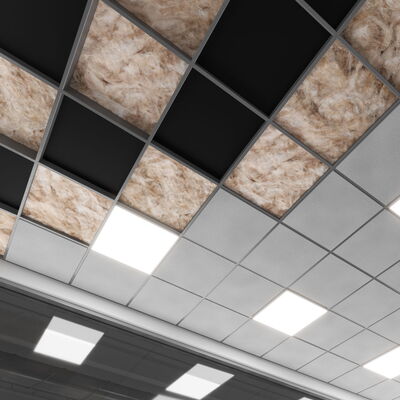- DDS Acoustical Specialties
- Applications
- Architectural
- Health Centers
Creating Quiet, Healing Environments
In health centers, clinics, and hospitals, maintaining a quiet environment is crucial for patient comfort, recovery, and overall well-being. Noise from medical equipment, staff conversations, foot traffic, and external sources can create a disruptive atmosphere that increases stress levels, impedes communication, and negatively impacts patient care. Effective noise control in health centers is essential to creating serene, healing environments that support patient privacy, enhance focus, and improve the quality of care.
Health center noise control solutions include acoustic panels, sound-absorbing ceiling tiles, and noise barriers designed to reduce noise pollution and improve acoustics in patient rooms, waiting areas, consultation rooms, and corridors. These solutions work to absorb, block, and diffuse sound, minimizing noise transmission and enhancing speech clarity. By implementing noise control measures, health centers can create more peaceful and functional spaces that promote patient recovery, support staff efficiency, and meet industry standards for acoustic comfort.
Investing in noise control demonstrates a commitment to patient-centered care and a high-quality environment for both patients and healthcare providers. Whether retrofitting existing spaces or incorporating noise control into new construction, these measures contribute to a more supportive, healing atmosphere that benefits everyone in the health center.
Create calm, private spaces, enhance communication, reduce stress, and ensure compliance, fostering comfort and confidentiality for patients and staff alike.
Benefits of Health Center Noise Control
- Stylish and Aesthetic
- Enhanced Patient Comfort
- Increased Privacy and Confidentiality
- Reduced Stress and Noise Levels
- Improved Speech Clarity
- HIPAA Compliance and Regulations
Most Often Used Products

Fabric Wrapped Acoustic Panels
Great acoustics are essential in all public and private environments. Whether you're designing a quiet office, an inspiring classroom, or an immersive performance space, managing noise and controlling sound reflections is critical.

Acoustic Door Treatment Kits
Keep your door, seal the gaps. Unwanted noise can be a major disruption, whether in an office, conference room, home theater, recording studio, or healthcare facility.

Quiet Cap Ceiling Tile Covers
In commercial buildings and offices with open plenum ceilings, sound transmission through ceiling systems can lead to compromised speech privacy, poor acoustic comfort, and distracting noise from adjacent rooms.

Sound Masking
In today’s dynamic work environments, maintaining a balance between collaboration and privacy is a challenge. Sound masking services offer an effective solution to create comfortable and productive spaces by reducing distractions and enhancing privacy.
Frequently Asked Questions
A:
Noise control enhances patient comfort, protects privacy, and reduces stress for both patients and staff, creating a calm and efficient healing environment.
A:
Common noise sources include medical equipment, HVAC systems, staff conversations, foot traffic, alarms, and external noise from nearby areas or construction.
A:
Reducing noise levels promotes relaxation, reduces stress, and fosters better sleep and recovery for patients, contributing to improved health outcomes.
A:
Effective solutions include soundproofing walls, acoustic panels, ceiling tiles, noise-reducing flooring, and door seals to minimize noise transmission and reverberation.
A:
Acoustic treatments prevent noise leakage and improve sound insulation, ensuring confidential conversations in consultation rooms, patient areas, and administrative offices.
A:
Yes, sound-absorbing materials in waiting rooms reduce noise from conversations and foot traffic, creating a more comfortable and less stressful environment for patients.
A:
Yes, noise control ensures compliance with HIPAA for privacy and OSHA standards for safe noise levels, supporting regulatory adherence and quality care.

